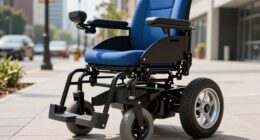As a snowbird retiree, you'll want to safeguard your finances by evaluating living costs, understanding tax implications, and choosing the right housing option. Think about healthcare services in both locations and maintain an emergency fund for unexpected expenses. Consider travel costs between homes and monitor your budget closely. Effective financial planning will help you navigate any economic changes. Keep these tips in mind, and you'll discover even more strategies for financial security along your journey.
Key Takeaways
- Evaluate the overall cost of living in both locations to ensure financial feasibility for your snowbird lifestyle.
- Create a detailed budget that accounts for travel, housing, and healthcare expenses at both residences.
- Research and understand state tax laws to optimize your retirement income and property tax obligations.
- Maintain an emergency fund to cover unexpected costs while living between two homes.
- Regularly review your financial plans to adapt to changes in expenses and economic conditions.

As you consider embracing the snowbird lifestyle, it's crucial to navigate the financial aspects that come with splitting your time between two homes. First, think about choosing the right location. Evaluate the overall cost of living, including housing, food, and transportation. Don't forget to research state tax laws, as they can significantly impact your retirement income and property taxes. Additionally, understanding tax implications can help you make more informed decisions regarding your finances.
Also, ensure that your chosen spot offers accessible and quality healthcare. You'll want to prioritize areas that match your lifestyle preferences, whether that means being near the beach or having urban amenities at your doorstep. And remember to factor in travel costs between your primary and secondary residences; these can add up quickly. Consider the potential benefits of inflation-protected annuities to help manage rising costs over time.
When it comes to financial planning and budgeting, developing detailed budget projections for both homes is essential. This will help you understand how to manage expenses effectively. It might be wise to work with financial advisors who can help you ensure that your snowbird lifestyle fits within your retirement financial plans.
Be mindful of potential economic shifts that could impact your savings and expenses. Good cash flow management is vital, as you'll need to support two residences and your travel. Moreover, maintaining an emergency fund is crucial for covering unexpected costs in either location.
Housing decisions play a big role in your financial well-being as a snowbird. Weigh the pros and cons of renting versus buying a second home. Renting offers flexibility and can help you explore different locations before making a long-term commitment.
On the other hand, owning a second home can build equity but also comes with additional financial responsibilities, like maintenance. Think carefully about whether owning aligns with your long-term financial goals.
Lastly, don't overlook healthcare and insurance considerations. If you're on Medicare, you'll generally have nationwide coverage, which gives you flexibility while traveling.
If not, review your commercial health insurance policies to understand coverage details in both locations. Be aware of potential out-of-pocket medical expenses and ensure that quality healthcare services are available where you'll be living. Proper insurance planning can help maintain continuity of care and safeguard your financial health in your snowbird adventures.
Frequently Asked Questions
How Do I Choose the Right Location for Snowbirding?
When choosing the right location for snowbirding, start by considering your climate preferences.
Do you enjoy mild winters? Look at places like Florida or Arizona.
Think about the activities you love—golf, hiking, or boating—and find a community that supports those interests.
Also, evaluate the cost of living, accessibility to healthcare, and social opportunities.
Balancing these factors will help you find a destination that suits your lifestyle and enhances your retirement experience.
What Are the Tax Implications of Snowbirding?
When you're snowbirding, understanding the tax implications is crucial. Spending more than 183 days in one state can establish residency, impacting your tax obligations.
You might owe income tax in both your home state and your snowbird state, depending on their laws. Be aware of property taxes for multiple homes and varying local taxes.
Consulting a tax professional can help you navigate these complexities and avoid costly mistakes.
How Can I Manage Health Insurance While Traveling?
To manage health insurance while traveling, you need to understand your coverage options thoroughly.
If you're on Original Medicare, you'll have nationwide access, but check if your providers accept it.
For Medicare Advantage, verify travel benefits.
It's wise to choose a Part D plan that covers medications in both locations.
Consider travel medical insurance for short trips.
Always coordinate with your healthcare providers to ensure continuity of care wherever you are.
What Should I Do With My Home While Away?
What should you do with your home while you're away? Consider renting it out to generate income, or hire a property manager to handle maintenance and tenants.
Regular checks can prevent issues, and asking neighbors for help adds peace of mind.
Make sure to secure valuable items in storage, clean thoroughly, and manage utilities to protect your home.
With the right preparations, you can enjoy your travels without worry!
How Can I Keep Track of Expenses During My Travels?
To keep track of expenses during your travels, consider using real-time tracking apps like Mint or Personal Capital, which allow you to monitor spending as it happens.
If you prefer a hands-on approach, manually record expenses in a notebook or spreadsheet. Automated tools like Quicken can also simplify budget management.
Regularly review your expenses to spot any patterns and adjust your budget accordingly, ensuring you stay on top of your finances while enjoying your travels.
Conclusion
By following these essential tips, you’ll not only protect your finances but also unlock the secret to a worry-free snowbird lifestyle. Imagine basking in the sun without a care in the world, knowing your money is safe and sound! Embrace your adventure with confidence, and let your golden years be filled with joy and exploration. Remember, a little planning goes a long way, so take charge and enjoy every moment of your retirement journey! To further enhance your peace of mind, consider managing inherited IRAs effectively, as this can significantly boost your financial stability during retirement. Knowledge of different withdrawal strategies and tax implications will empower you to make informed decisions that align with your long-term goals. By staying proactive and informed, you’ll ensure that your financial strategy supports the adventurous and carefree lifestyle you deserve.









